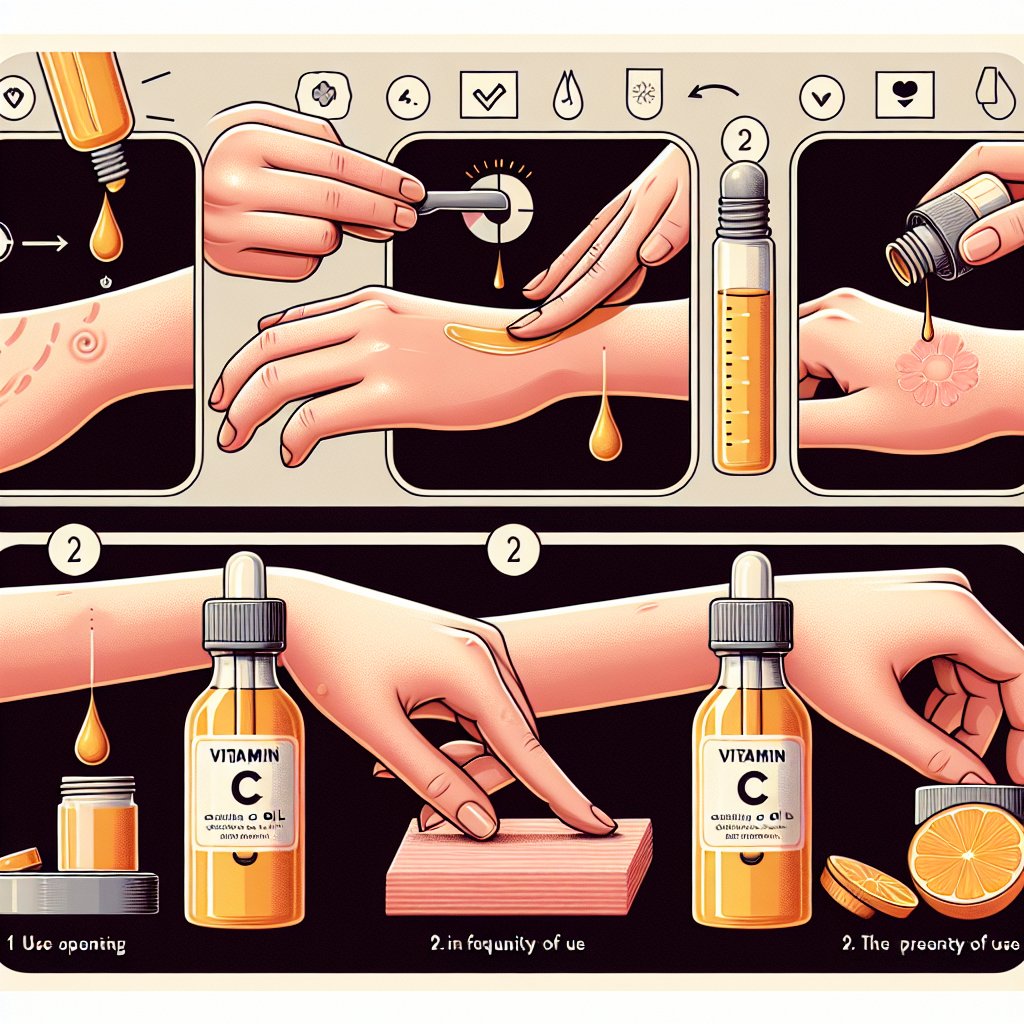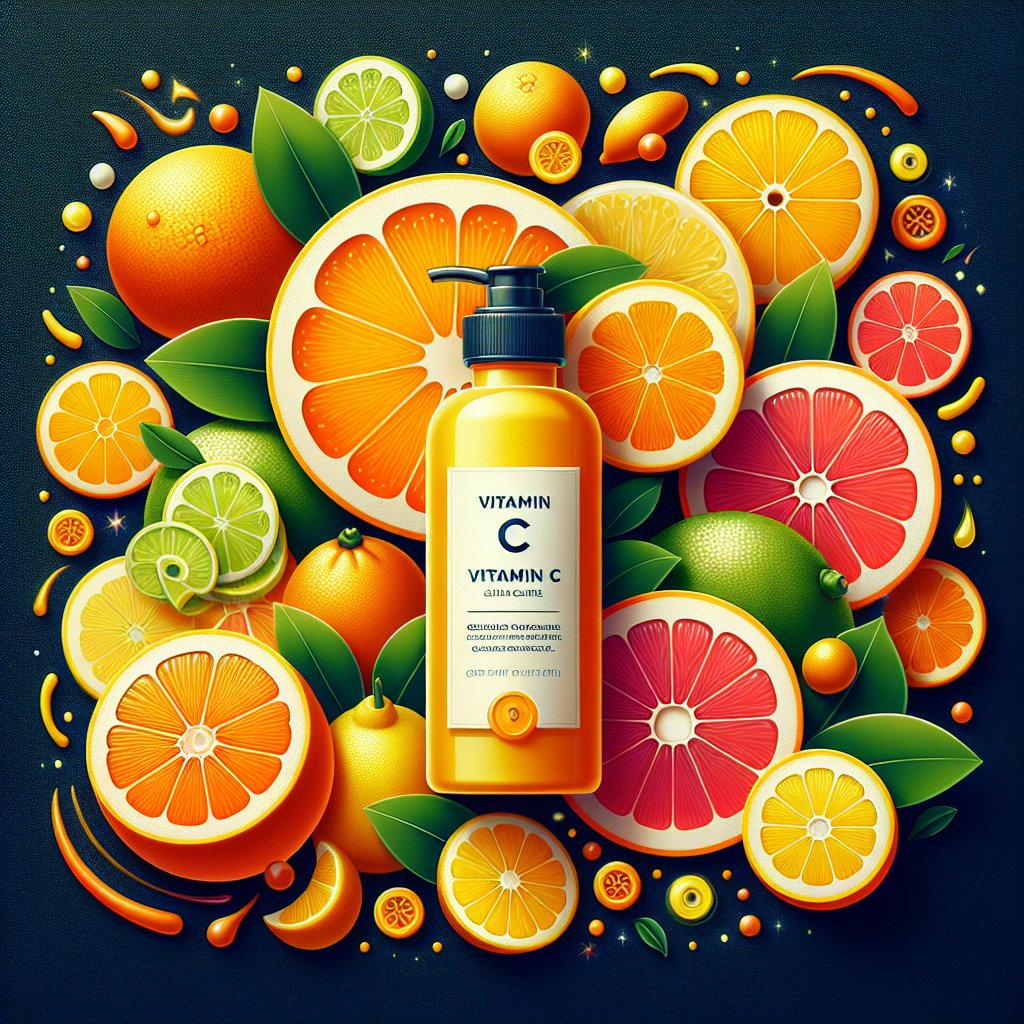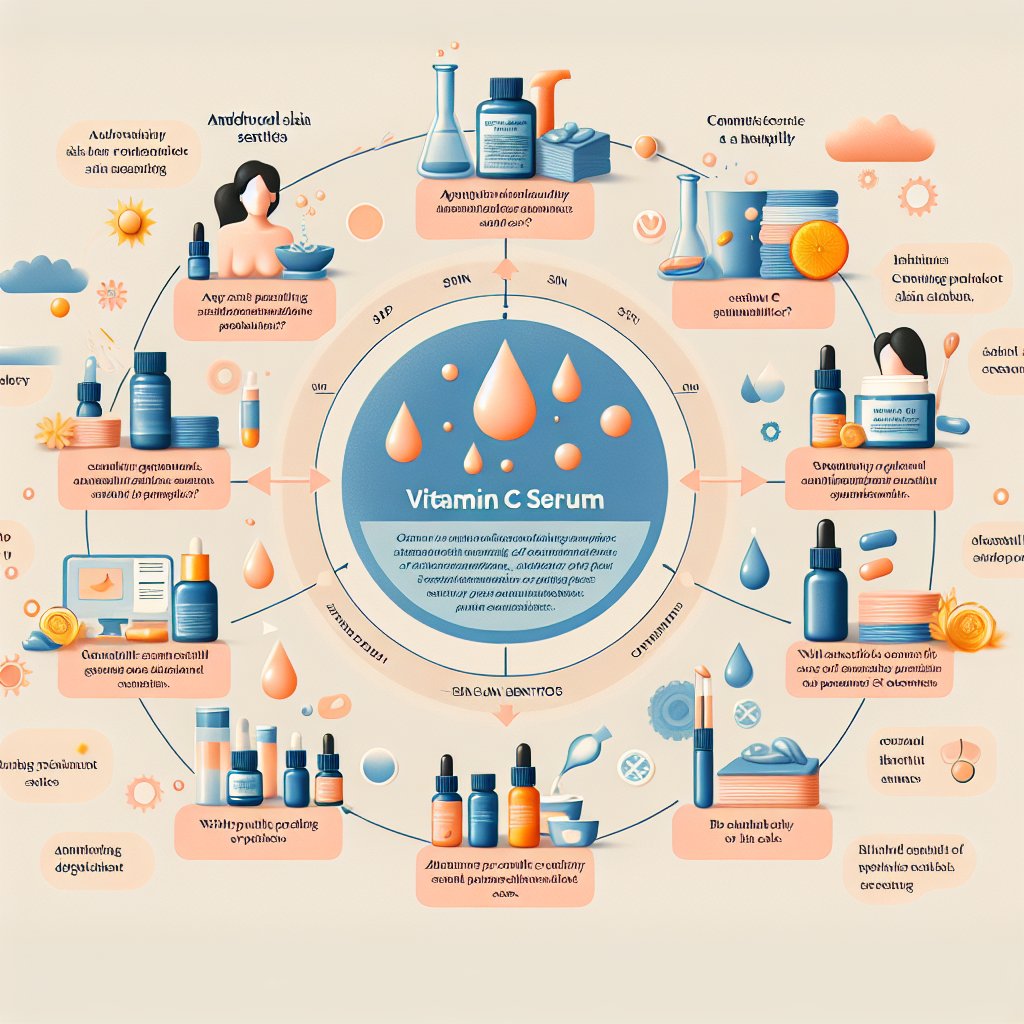Say Goodbye to Scars: The Ultimate Guide to Using Vitamin C Oil for Scar Reduction
Introduction to Vitamin C Oil
Hey there, keto beauties! Today, we’re diving into the wonderful world of Vitamin C oil and its incredible benefits for skin health. If you’re looking for a natural and effective way to reduce scars and boost your skin’s radiance, then you’ve come to the right place.
So, what exactly is Vitamin C oil? Vitamin C oil is a powerful skincare ingredient derived from the vitamin itself. It’s a potent antioxidant that protects the skin from free radicals and supports collagen production, making it a superhero when it comes to skin repair and rejuvenation.
Benefits for Skin Health
The benefits of Vitamin C oil for skin health are truly remarkable. Not only does it help to brighten and even out skin tone, but it also works wonders in reducing the appearance of scars. Scientific research has shown that Vitamin C oil aids in the reduction of hyperpigmentation, and when used consistently, it can visibly lighten acne scars and other blemishes over time.
One study published in the “Dermatologic Surgery” journal found that the application of Vitamin C oil significantly improved the appearance of surgical scars, leading to smoother and less noticeable scar tissue. This speaks volumes about the effectiveness of Vitamin C oil in combating various types of scars, giving hope to those who are on a quest for flawless skin.
In addition to scar reduction, Vitamin C oil also promotes overall skin health by boosting collagen synthesis and protecting the skin from environmental stressors. So, not only are you bidding adieu to pesky scars, but you’re also greeting a more radiant, youthful complexion.
In the next section, we’ll delve into the best practices for using Vitamin C oil to achieve optimal results in scar reduction. Let’s get glowing!

Detailed Explanation of Different Types of Scars and Their Causes
Scars come in various forms, with each type having its unique characteristics and causes. Understanding the different types of scars and what contributes to their formation can help us take the necessary steps to reduce their appearance. Two common types of scars are acne scars and surgical scars.
Acne Scars
Acne scars are the result of severe acne, which can leave behind various types of scars such as icepick, boxcar, and rolling scars. These scars form when the skin tissue is damaged due to inflamed acne lesions. Factors such as genetics, the severity of the acne, and delayed or improper treatment can contribute to the formation of acne scars.
Surgical Scars
Surgical scars are the outcome of a surgical incision or wound. Their appearance and severity can be influenced by factors such as the surgical technique used, the individual’s skin type, and post-operative care. Additionally, the size and depth of the incision play a role in how the scar develops.
Aside from these specific types, other factors can contribute to the formation of scars in general. For instance, the way our bodies heal wounds and the amount of collagen produced during the healing process can impact the appearance of scars. Additionally, the presence of infections during the healing phase, as well as the location of the wound on the body, can also affect the type of scar that forms.
Understanding these different types of scars and the factors that contribute to their formation is crucial when considering methods to reduce their appearance. If you’re looking for an effective natural solution, Vitamin C oil has been gaining attention for its potential in reducing the appearance of various types of scars.
Role of Vitamin C in Scar Healing
When it comes to reducing scars and improving skin texture, Vitamin C is a powerhouse ingredient that receives a lot of attention. Scientific research has demonstrated that Vitamin C plays a crucial role in the skin’s natural healing process and aids in scar reduction.
One of the key ways Vitamin C contributes to scar healing is through its collagen-boosting properties. Collagen is the main protein that provides structure to the skin. Vitamin C enhances collagen production, which helps in promoting skin elasticity and firmness, ultimately leading to improved scar appearance over time.
Furthermore, Vitamin C is an antioxidant, which means it helps protect the skin from oxidative stress caused by free radicals. This protection is vital for the healing of scars as it creates a favorable environment for the skin to repair and regenerate. Additionally, the application of Vitamin C oil aids in improving skin texture, making it an ideal choice for those looking to reduce the appearance of scars and achieve smoother, healthier-looking skin.
Now that we understand the science behind it, let’s explore how you can incorporate Vitamin C oil into your daily skincare routine for effective scar reduction.
Choosing the Right Vitamin C Oil
When it comes to selecting the best vitamin C oil for scar treatment, not all products are created equal. To truly maximize the benefits, it’s essential to consider several key factors before making a purchase.
Concentration
Look for vitamin C oil with a high concentration of L-ascorbic acid, the active form of vitamin C. According to research published in the Indian Dermatology Online Journal, a concentration of 10-20% is optimal for promoting collagen synthesis and reducing the appearance of scars.
Purity
Opt for a product that is formulated with pure vitamin C, free from artificial fragrances, colors, and preservatives. Pure vitamin C oil ensures that you are getting the most potent and effective form of the vitamin for scar treatment, as highlighted in a study by the European Journal of Dermatology.
Additional Ingredients
Consider the additional ingredients in the vitamin C oil. Some beneficial additives to look for include vitamin E and ferulic acid, as they can enhance the stability and efficacy of vitamin C. Studies have shown that the combination of vitamin C and E provides photoprotection and helps in the treatment of scars, as observed in the Journal of Cosmetic Dermatology.
By prioritizing these factors in your selection process, you can ensure that you are investing in a high-quality vitamin C oil that is most effective for scar reduction.
How to Use Vitamin C Oil for Scars
If you’re looking to reduce the appearance of scars, vitamin C oil can be an excellent addition to your skincare routine. Here’s a step-by-step guide on how to properly apply vitamin C oil for optimal results:
Step 1: Cleanse the Area
Before applying vitamin C oil, ensure that the scarred area is clean and dry. Use a gentle cleanser to wash the area and pat it dry with a soft towel.
Step 2: Apply a Small Amount of Vitamin C Oil
Using your fingertips, apply a small amount of vitamin C oil directly to the scar. Gently massage the oil into the skin using circular motions. Be sure to cover the entire scarred area with a thin layer of oil.
Step 3: Allow for Absorption
Allow the vitamin C oil to fully absorb into the skin before applying any other skincare products or makeup. This will ensure that the oil penetrates the skin and works effectively on the scar.
Step 4: Frequency of Use
For optimal results, apply vitamin C oil to the scarred area twice daily – once in the morning and once at night. Consistency is key when it comes to seeing improvement in the appearance of scars.
Potential Side Effects
While vitamin C oil is generally safe for topical use, some individuals may experience mild irritation or redness at the application site. It’s always recommended to perform a patch test before regular use and consult with a dermatologist if you have sensitive skin or experience any adverse reactions.
By following these simple steps, you can harness the benefits of vitamin C oil to promote scar reduction and achieve smoother, more even-looking skin.

Benefits of Vitamin C Oil Over Other Scar Treatments
When it comes to scar treatments, Vitamin C oil stands out as a natural and effective option with several potential advantages over other treatments. Let’s compare Vitamin C oil with other scar treatments and see why it’s gaining so much attention.
Natural Properties
Vitamin C oil is derived from natural sources such as rosehip oil, sea buckthorn oil, or from the extraction of ascorbic acid. Its natural properties make it appealing to those looking for a more organic approach to scar reduction. Unlike some other scar treatments that contain synthetic chemicals, Vitamin C oil is often seen as a gentler and safer alternative for the skin.
Effectiveness
Scientific research has shown that Vitamin C oil can effectively aid in scar reduction. A study published in the Indian Dermatology Online Journal found that the topical application of Vitamin C oil significantly improved the appearance of surgical scars compared to the control group.
Furthermore, Vitamin C is known for its role in collagen synthesis, which is crucial for skin repair and scar healing. This natural process makes Vitamin C oil a compelling choice for those seeking an effective scar treatment.
Potential Advantages
One of the major advantages of Vitamin C oil is its antioxidant properties. Antioxidants help protect the skin from damage caused by free radicals and UV exposure, promoting overall skin health and potentially preventing the formation of new scars.
Additionally, Vitamin C oil has been reported to have a brightening effect on the skin, which can help diminish the appearance of hyperpigmentation often associated with scars.
Overall, due to its natural properties, effectiveness in scar reduction, and potential skin benefits, Vitamin C oil presents a compelling case as a superior option compared to other scar treatments.
Precautions and Considerations
When it comes to using Vitamin C oil for scars, there are a few important precautions to keep in mind to ensure your safety and the effectiveness of the treatment.
Potential Allergic Reactions
Before incorporating Vitamin C oil into your skincare routine, it’s crucial to perform a patch test to check for any potential allergic reactions. Apply a small amount of the oil to a discreet area of skin, such as the inner arm, and monitor for any signs of redness, itching, or irritation for at least 24 hours. If you experience any adverse reactions, discontinue use immediately and consult a dermatologist.
Sensitivity to Sunlight
Vitamin C oil, while beneficial for scar reduction, can make your skin more sensitive to sunlight. It’s essential to apply sunscreen with a high SPF when using Vitamin C oil to prevent sunburn and further skin damage. Additionally, consider using Vitamin C oil as part of your nighttime skincare routine to minimize sun exposure after application.
Recommendations for Patch Testing
To ensure your skin can tolerate Vitamin C oil, it’s advisable to begin with a lower concentration and gradually increase the strength as your skin acclimates to the treatment. Additionally, if you are using other skincare products or medications, consult with a healthcare professional to avoid any potential interactions or adverse effects.
By taking these precautions and considerations into account, you can harness the benefits of Vitamin C oil for scar reduction while safeguarding your skin’s health.
VIII. User Reviews and Testimonials
One of the most compelling ways to understand the effectiveness of Vitamin C oil for scars is through real user experiences and testimonials. Hearing how this powerful oil has positively impacted others can provide valuable insights and encouragement for anyone looking to diminish scars.
Real-Life Stories of Success
Several users have shared their remarkable journeys of using Vitamin C oil for scar reduction. One woman, Sarah, explained how she had struggled with acne scars for years and felt self-conscious about them. After consistently applying Vitamin C oil to her skin, she noticed a visible reduction in the appearance of her scars. Not only did the scars fade, but her skin also appeared more radiant and healthier.
Another individual, Emily, shared her experience with using Vitamin C oil to diminish a post-surgical scar. She was astounded by the significant improvement in the texture and color of the scar, which had previously been a source of discomfort and self-doubt. Emily’s success story highlights the versatility of Vitamin C oil in treating various types of scars.
Testimonials Emphasizing Effectiveness
Additionally, numerous testimonials from individuals who have incorporated Vitamin C oil into their skincare routines have emphasized the oil’s effectiveness in reducing scars. Many users have reported softer, smoother, and more even-toned skin after regularly using Vitamin C oil, praising its ability to fade scars over time.
Reading such positive experiences from real users can be immensely impactful and motivational for those considering Vitamin C oil for scar reduction. These firsthand accounts offer tangible evidence of the oil’s effectiveness, providing hope and inspiration to others who are on a similar journey to diminish their scars.
Summarizing the Benefits of Vitamin C Oil for Scar Reduction
Throughout this article, we have explored the incredible benefits of incorporating vitamin C oil into your scar treatment regimen. Vitamin C is a powerful antioxidant that has been extensively researched for its role in promoting skin health and aiding in scar reduction.
Promotes Collagen Production
Research has shown that vitamin C plays a key role in collagen synthesis, which is essential for skin elasticity and firmness. By applying vitamin C oil to scars, you can support the skin’s natural regeneration process, leading to improvements in the appearance of scars over time.
Reduces Inflammation
Studies have demonstrated that vitamin C possesses anti-inflammatory properties, which can help to calm redness and swelling associated with scars. This can contribute to a smoother and more even skin texture over time.
Protects Against UV Damage
Vitamin C oil acts as a shield against UV damage, helping to protect scarred skin from the harmful effects of the sun. This is crucial in preventing further damage to the skin and maintaining the progress made in scar reduction.
Enhances Overall Skin Health
Beyond scar reduction, incorporating vitamin C oil into your skincare routine can promote overall skin health, giving you a radiant and youthful complexion.
By harnessing the benefits of vitamin C oil, you can actively support your skin’s healing process and achieve noticeable improvements in the appearance of scars, while also enjoying the broader benefits of enhanced skin health.


